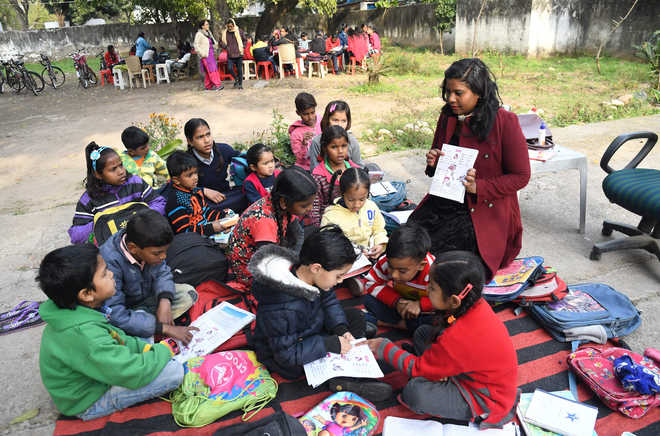
Mamta
Aradhika Sharma
The theme of Women’s Day, 2019 is #BalanceforBetter, whereby the call to women and their supporters is for “collective action and shared responsibility for driving a gender-balanced world. The International Women's Day, celebrated globally, commemorates and acknowledges the social, economic, cultural and political achievements of women — “while also marking a call to action for accelerating gender balance.”
The struggle for equality is even harder for women in India. The social mores, restrictions and the lopsided gender rules on the ground ensure that they remain confined to their homes — even if they are in abusive marriages or unsafe environments or are deprived of their basic human rights, are neither valued nor cherished. The more financially underprivileged the family, the harder it gets for these women to have a decent life.
Still, there are some women, unacknowledged and uncelebrated, who have broken the shackles of gender imbalance and bravely fought challenging circumstances and have overcome these through sheer grit and perseverance. These are kickass women, who stand proud and strong, not needing a man to add value to their lives, but taking care of their families, making a home for themselves and being an essential part of the country’s workforce.
They are all around us — maids that scurry around us from the early in morning, women who work as cleaning staff in hospitals, offices and markets, women who sell fish and vegetables, drive cabs, clean the streets, sell chai and other numerous things around us unseen, and sometimes unacknowledged. These are the gritty women who should be acknowledged and provided with education and career opportunities because despite the fact that they have had neither, they’ve struggled, survived and emerged winners.
Mamta: teacher/Paralegal volunteer
Mamta grew up in an upmarket residential area of Chandigarh, Sector 9, one of the most posh sectors of the union territory. But she lived in the servant’s quarter of the house where her parents were employed as household staff. Mamta was good in studies and wanted to join the police but could only study till Class XII. Her parents “married her off” to a man from their village immediately after school. “I was forced to abandon every choice I made regarding my own life and had to live a life ruled by my parents’ choices for which I paid a heavy price,” recalls Mamta.
At first, the newly-wed couple stayed in the servant’s quarters with her parents until Mamta’s husband decided to move to their “own” house. That essentially meant that Mamta had to take employment as a cleaning maid with a family who was offering staff quarters for the couple to live in. Mamta’s husband, who worked in a hotel, was a suspicious man. He would make surprise visits home to ‘spy’ on Mamta and heaped on her a barrage of abuses, accusing her of having multiple affairs. The verbal abuses were soon followed by regular beatings. Finally, he dumped a pregnant Mamta at her parent’s house where she gave birth to a son.
To support the expenses of a growing child, Mamta decided to learn new skills. She joined stitching classes, thereafter started doing some minor stitching work for people. In 2009, she met her old teacher in the market, who was running an NGO called Hamari Kaksha that provided education to underprivileged children. The chance meeting resulted in Mamta joining Hamari Kaksha as a teacher. While teaching junior students, she found herself wondering: “If these kids can study, then why not me?”.
Armed with this resolution, Mamta did her graduation. Also somewhere along the way, tired of the abuses that her husband still meted to her from time to time, she filed for and got a divorce. Today, Mamta is a valuable asset of Hamari Kaksha, where she teaches and oversees office work. In addition, she works with the State Legal Services Authority as a volunteer, making people aware of their rights.
Living a life of dignity and on her own terms, Mamta says that today she’s a happy and confidant woman. She’s sure that no matter what cards life now deals her, she can play them well enough.“Aaj mujhe peeche murh ke dekhne ki zaroorat nahin hai. Main khush hoon!”
Rakesh alias Raksha: Computer Trainer
Raksha’s is the story of a girl who has struggled to choose her gender and is in the process of changing it — of a gender that refuses to be defined by a body.
“I always used to say that I’m a tomboy! I liked to dress up like boys, wear jeans, tee shirts and men’s shoes and keep my hair short. I would spend hours looking at pictures of Bollywood heroines rather than of heroes. I’ve always had crushes on glamorous heroines,” says 22 year-old Rakesh, who was born Raksha. “In my early years, my mother would sigh in exasperated affection and my father would ruffle my hair and laugh and call me ‘mera beta’. But eventually, it was a traditional household and I would always be reminded that I was a girl. The reprimands to behave like a girl became more strident as I started growing up. That used to make me uncomfortable and rebellious as I always felt trapped in a girl’s body.”
Rakesh lives in an unregistered colony in Delhi. His father is in the music business. Financially, the family is keeping their heads above water. Everything was alright till their ‘daughter’ fell in love with another girl at the computer centre where they’re both working as trainers. “Chandni and I were attracted to each other right from the start. We soon fell in love and had a secret affair for a year. We decided that we couldn’t live without each other. I’d already been thinking of changing my gender for a few years now, and our love gave me the courage to break the news to my parents,” says Rakesh.
Rakesh’s parents were shocked when they heard of his plans. “My mother went into depression.” They refused to acknowledge their love. However, Rakesh was adamant. The two lovers even ran away from home but were found and brought back. “There were lots of rona-dhona and threats, but I stood firm. ‘Mujhe is body mein ghutan hoti hai. Do you want me to die with suffocation and grief’?” Rakesh asked his family. Finally, true love and the struggle for identity prevailed and his parents agreed to sanction the two girls’ relationship and his plans for change of gender. “I have now decided to go in for a reconstructive surgery and am seeing a psychiatrist, who will certify that I am mentally fit to undergo such a transformation. While some people have accepted me, others haven’t. But change and acceptance is coming into society.
“Today, I define myself as transgender. I’ve rid myself of my conflict and I look forward to a life with my Chandni.”
(Names in this section have been changed)
Reena Dubey: Support Staff
“In the past three years, my husband has been in and out of hospital innumerable times. Platelet transfusions, chemotherapies, radiation, MRIs — this has been my life,” says Reena Dubey.
Reena was born into a poor family in Bapu Dham colony of Chandigarh. She lost her father when she was 6. She studied till age 15 and then decided to contribute to the family kitty. She worked in a medicine factory for a few years and then did a course in stitching and embroidery and earning some money through this skill. At 21, she was married to a poor boy, who worked in a hardware store. In the next few years, as her family grew, (she had three children), Reena worked at various enterprises — providing a laundry service, making packaging material for medicines. Like any mother, Reena had aspirations for her children. After sending her eldest daughter to hostel, she decided to seek work outside. “I was willing to do any job that provided me with reasonable income and respect,” says Reena.
But life had other plans for her. Her husband was diagnosed with blood cancer. Despite limited means, Reena left no stone unturned to seek medical help for him — approaching the ESI, NGOs who worked in this field, the company insurance, etc. “Relatives advised me to go to my native village with my children, saying that we would be provided for there, but I was stubborn. For me, my children’s education was paramount. so I stayed. Slowly, all my relatives withdrew support.”
Expenses grew. There were times when she wasn’t even sure about from where the next meal was coming. Yet, she kept up the struggle, even crowdsourcing funds at Facebook for medical expenses. “Adversity teaches enterprise,” she says. Her husband is at the terminal stages, but Reena’s spirit sustains her and drives her in her efforts. “You can’t go into depression — you have to keep fighting. I’ve felt alone, depressed and helpless during this journey, but along the way I have discovered my own strength, God’s mercy and the kindness of good people.
Madhuri Haldar: Household Cook
Hailing from a small village in Kolkata, Madhuri, mother of two teenaged kids, and working as a household ‘daily help’ Madhuri goes about her life with confidence, strength and sheer bravado. “We’ve been working since we were kids living in Bengal. I used to work in our father’s fields, take the goats out to graze and later, I kept ducks. We got only one meal a day. For the rest, we had to manage on our own.”
She was married off to a labourer in Murshidabad when she was just 14. A few years later, she and her husband migrated to Baddi, where she got a job in a factory. Madfhuri’s children were then 3 and 1½ years old then. The demand for dowry and the beatings and torture had already begun but now, the man of the house decided to abandon his family, leaving his young wife and kids, who spoke no other language but Bengali, to fend for herself and the kids.
Madhuri started to cook in a factory that manufactured goods for the Indian Railways. She then moved to Chandigarh where she rented a small room, put her kids in school and went to work, cooking, cleaning, washing, as well as picking up part time work. Today after years of struggle and hard work, she owns a small plot of land and walks tall. Does she miss her husband?
“ Not a bit! Who needs a man?” she tosses her head. Today, I have everything! I have a fridge, cooler, my kids have mobile phones and nice clothes. They’re well dressed and studying in good institutes. I’ll start building my house on my chota sa plot in the colony this year. Aur kya chahiye?
Exactly, what else you need — a spirit to carry on against all odds and survive life’s curveballs through sheer grit.



























